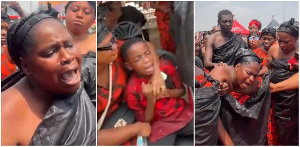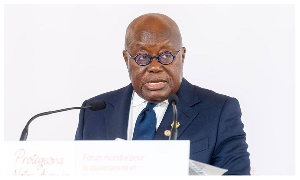If Aaron Mike Ocquaye has opinions, you are going to hear them. And as Ghanaians have come to know, the septuagenarian is a strong-willed polemicist with views he would have hoped were not considered contrarian, as far as national narratives are concerned.
A lawyer and political science professor, Ocquaye’s life has been dedicated to an academic critique of Ghana’s political history, most especially, the independence story that can sometimes sound like the bildungsroman of first president Kwame Nkrumah. Ocquaye is not sympathetic to the hero-worshipping of the man celebrated across the world among leftists.
“Nkrumah did not alone compose the classical sonata and constitute the orchestra which sang Ghana’s clarion call to independence in sweet melody, all in two months! The fathers of the nation were there already,” Ocquaye told a gathering in Accra on August 4, 2020. It was a speech at the second commemoration of what is now known as Founders’ Day in Ghana.
August 4 is what Ghana calls Founders’ Day while September 21, Nkrumah’s birthday, is supposed to be called the Kwame Nkrumah Memorial Day. Founders’ Day is very much a result of Ocquaye’s historiography. The day was instituted by the New Patriotic Party (NPP) government headed by President Nana Akufo-Addo to celebrate those believed to have laid the groundwork or helped Nkrumah in irreducible ways toward Ghana’s independence on March 6, 1957.
“They included Paa Grant, J.B. Danquah, Akufo-Addo, Ako Adjei, Obetsebi Lamptey, and William Ofori-Atta. It needs to be emphasized – something existed before Nkrumah was invited to come and help,” Ocquaye, who is also Ghana’s speaker of parliament, argued in his speech.
All of the names noted by Ocquaye are known by a vast majority of Ghanaians, with each man occupying a different pedestal of appreciation in the independence struggle. Indeed, with the exception of Grant, all the other men together with Nkrumah have been known as the Big Six, the creation of an incident in 1948 when they were arrested by the colonial government. The six were blamed for inciting anti-government riots in Accra.
But the argument forwarded by Ocquaye and other like-minded Ghanaians goes beyond the Big Six. They are fighting an ideological and historical battle against the primacy of Nkrumah when the story is told of how the first sub-Saharan African country gained independence. This has obviously won them more than a few critics like Kwesi Pratt, the socialist editor of The Insight newspaper who described the push to identify Nkrumah as one among others, as a “rewriting of history”.
The historical angle of the problem is a question of when the independence struggle began. Ocquaye identifies “five main eras: 1844 – 73; 1873 – 97; 1900 – 24; 1925 – 45; 1946 – 57”. These eras are marked by varying degrees of agitation against the British colonial hierarchy in Ghana, but not all of these were on a national scale. Some of these periods saw ethnic and/or tribal pushback against the British. Even though the British had been awarded the geographical space that is modern Ghana at the Berlin Conference, northern Ghana, for instance, did not become a British protectorate until 1902.
For Pratt and others who would prefer the sanctity of Nkrumah’s place in the annals untouched, it is better to gauge the independence struggle from when it can properly be argued that a national consciousness arose among the people of the British-dominated geographical space. For instance, the legislative assembly constituted after the 1951 general election was the first time a representative body, comprising one person from everywhere, had been put together (except from the modern Volta Region in the east which became part of Ghana in 1956). That legislative assembly after 1951 was national in character, and thus, arguably a good point to speak of national agitation.
The period marked by Nkrumah’s defenders as the best to trace Ghana’s national independence struggle falls in the last lap of Ocquaye’s chronicles. Nkrumah himself returned to Ghana in 1947 after spending years living in the United States and the United Kingdom. He was invited by Joseph Boakye Danquah – J.B. Danquah.
Danquah descended from royalty among the Akyem of eastern Ghana and his brother was a monarch of his people. Danquah’s family was one of the earliest to gain solidly from western formal education started by the Basel Mission as well as by the colonial government. He lived in London throughout his 20s, just like many other Gold Coasters of similar privilege. The Gold Coast boasted a small bourgeoisie which was a class of mostly legal practitioners, teachers, and merchants at the beginning of the 20th century. This class was essentially male-populated and had the means as well the intellectual acumen colonizers found either useful for colonial perpetuation or inimical to that cause.
Danquah and others of his class founded the United Gold Coast Convention, the first true political party in Ghana on August 1, 1947. The invitation to Nkrumah was to come help fight for “self-government within the shortest possible time”. Nkrumah accepted the invitation and came to the Gold Coast but after their arrest in 1948, the rapport between the Leninist-Marxist and the men who had invited him was severed on ideological grounds.
While Nkrumah’s Pan-African ideology, as well as his sense of Africanness, was necessarily Marxian socialist, the view of the others, particularly Danquah their leader, was much different. Although he did not take the time to concretize his own political philosophy in a lot of writing as did Nkrumah, Danquah’s philosophy was akin to Thatcherite conservatism. In another sense, the philosophy Danquah called Ghanaism is very much the liberalism of Enlightenment Europe, placing the most fundamental agency at the doorstep of the socialized individual.
This was how Ghanaism was described by Albert Adu Boahen, a historian and politician, in a 1988 lecture titled “The Ghanaian Sphinx: Reflections On The Contemporary History of Ghana”: “In other words, as opposed to Marxism or scientific socialism, the ideology of Ghanaism emphasizes the worth of the individual, individual initiative and individual enterprise; it emphasizes the freedom and dignity of the individual and not sordid materialism, regimentation and state ownership of property as Marxism or socialism does.”
It was not uncommon for Danquah to marry western and African ideals, in any way. His The Akan Doctrine of God (1944) is read as an African traditionalist defense of Christianity.
But Nkrumah’s ideological categorization of bourgeoisie and proletariat in the Gold Coast was not merely a rendition of colonizer vs colonized. Among Nkrumah’s conception of the bourgeoisie were the UGCC leadership which had invited him, men who came from privileged backgrounds; men he felt were in cahoots with the colonizer; men he felt could wait for the shortest possible time for independence, whenever that was.
Nkrumah’s own party formed in 1949, the Convention People Party (CPP), wanted “self-government now” and had no qualms about disturbing public peace. He could not afford to make his approach to the independence question purely diplomatic like Danquah and co had promised.
The ideological differences did not end there. While Danquah was a proponent of federalism, Nkrumah favored a unitary system of power. This disagreement was one of the most contentious between the two men which led to a coalition of political and ethnic parochialists forming the United Party (UP), headed by Danquah.
These days, Danquah’s defenders include Ocquaye, President Akufo-Addo (Danquah’s grand-nephew) and the NPP, a party thought to be right of center. Nkrumah’s narrative defenders are his own CPP, a measly political party, the National Democratic Congress (NDC) founded by the late firebrand Jerry Rawlings and indeed, anyone who considers themselves anti-NPP.
This is a debate central to a nationally significant philosophy of identity. Ghanaians have not seen the end of the debate.
General News of Monday, 8 March 2021
Source: face2faceafrica.com

















